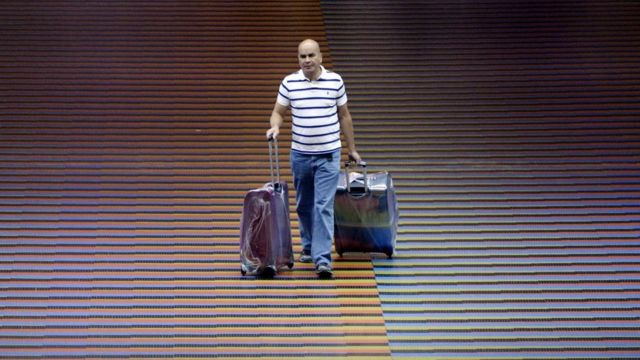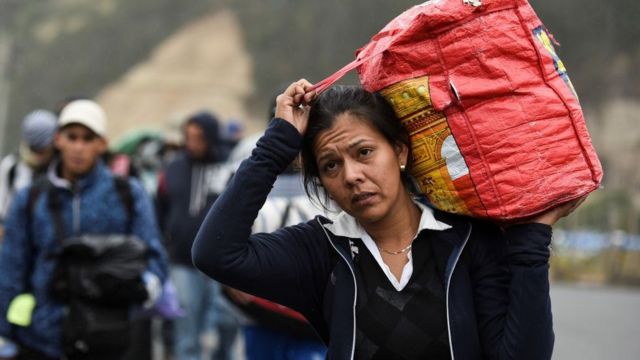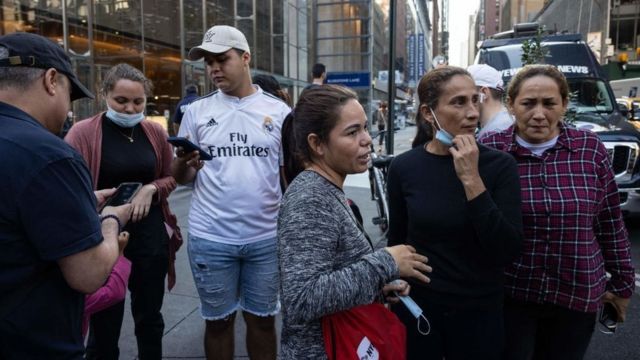Thousands of Venezuelans are entering the US every month across the border with Mexico
"Balseiros do ar" is an expression that became popular a few decades ago to describe Venezuelans who emigrated to the United States after Hugo Chávez took power in 1999.
Killed in 2013, Chávez ruled Venezuela for 14 years.
This phrase no longer describes how Venezuelans enter the USA, which lately is more like so-called "wetbacks" ( "wet backs", in free translation ), a term coined in the 1920s — and often used disparagingly — to refer to those who crossed the border swimming through Rio Grande do México.
In August of this year, the number of Venezuelans who tried to cross the border from Mexico to the United States was greater than that of Guatemalans and Hondurans. Only the Mexicans themselves made more crossings.
That month, the American border patrol detained 25,349 Venezuelan citizens, four times more than August 2021 ( 6,301 ).
The number of Brazilians trying to cross Mexico's border with the USA fell in the same period - there were 5,750 arrests against 9,100 a year earlier. In December last year, under pressure from the American government, Mexico started to collect tourist visas from Brazilians.
In September, according to the United States Department of Homeland Security ( DHS, in the acronym in English ), the contingent of Venezuelans detained on the southern border increased further: 33,000.
But perhaps the data that shows more clearly how things have changed in the past two years is as follows: between the fiscal years of 2014 and 2019, the monthly average of Venezuelans' arrests was 127.
In total, between fiscal year 2021 and fiscal year 2022 ( which ended on September 30 ), Venezuelans' arrests at the border increased by 293%, according to DHS.
Faced with this situation, the government of American President Joe Biden announced on Wednesday ( 12/10 ) a new policy that provides for the expulsion to Mexico of all Venezuelans who enter the USA without authorization by the border, but who, at the same time, grant humanitarian permission to about 24,000 of them, meeting a number of requirements.
But why are so many Venezuelans entering the United States across the southern border?
A country in crisis
Historically, Venezuelans had no tradition of emigrating.
On the contrary.
In the 20th century, Venezuela served for decades as a welcoming place for people coming, especially from other countries in Latin America and southern Europe.
Simón Bolívar International Airport in Caracas has become the gateway for millions of Venezuelans
The deep crisis that Venezuela has experienced in the past seven years has completely changed this dynamic and the country has become a major emitter of migrants.
About 7.1 million Venezuelans ( about 20% of the population ) currently live as migrants or refugees in different parts of the world, according to UN data from September 2022.
According to Juan Navarrete, deputy director for the Amnesty International Venezuela refugee crisis based in Bogotá ( Colombia ), this number shows that the Venezuelan migratory crisis showed no signs of cooling — in August the number of refugees was 6.8 million people.
"The flow of people leaving Venezuela continues, although perhaps not in the same proportion as the 2015-2017 period," Navarrete tells BBC News Mundo, the BBC's Spanish news service.
Julia Gellat, senior analyst at the Migration Policy Institute, a study center based in Washington ( United States ), believes that a combination of difficult economic and political conditions has been forcing Venezuelans to leave the country.
In his view, some people who have decided to stay in Venezuela until now have been waiting for the fall of Nicolás Maduro's government and, as this has not happened, now believe it is time to leave.
Venezuela emerged from a long period of hyperinflation in December 2021, but remains one of the countries with the highest inflation in the world.
In the past two months, the Venezuelan currency has depreciated by about 30% against the dollar, whose official price went from 6.28 bolivars per dollar in August to 8.26 bolivars per dollar this week, which leaves the monthly minimum wage of Venezuelans around US $ 16 or R $ 85 — in Brazil, for comparison purposes, the minimum wage is R $ 1,212.
Change in the migratory trend
Since the beginning of the migratory crisis, most Venezuelans who have decided to leave the country have migrated to other nations in Latin America and the Caribbean: about 5.96 million.
Thousands of Venezuelans emigrated by land to other South American countries
It is estimated that there are almost 2.5 million Venezuelans in Colombia, 1.5 million in Peru, 500 thousand in Ecuador and 450 thousand in Chile. In Brazil, there are about 260 thousand, according to UN data.
However, Navarrete explains that the conditions for Venezuelans to enter and stay in the region have become more difficult in recent years.
This led to a change in the migratory trend. So now, instead of looking for routes to the south, Venezuelans looking for a better life abroad have started to look more to the north.
"As in the north there is the Strait of Darién [ a very dangerous jungle that migrants from Colombia to Panama must cross ], in the south, since the coronavirus pandemic, the countries of the region began to demand visas and other documents that are difficult to obtain from Venezuelans ", he says.
The expert indicates that these difficulties are compounded by some episodes of xenophobia that occurred in some countries like Chile and Peru, which migrants also take into account when thinking about possible destinations.
Added to all this is the fact that, since the coronavirus pandemic, the economic situation in Latin American countries has deteriorated for both the local population and immigrants, who were in an even more precarious situation.
"I think a change that has recently occurred is that economic conditions in other countries have led Venezuelans to come to the United States," says Julia Gelatt.
US attractiveness and 'migratory intelligence'
Navarrete explains that, given the deteriorating economic conditions and the growing difficulties of going to other Latin American countries, the United States may appear as a more attractive place in the minds of Venezuelan migrants.
"A Venezuelan migrant who lives begging for money on the streets of Colombia may think he can get a lot more money in the United States, where livelihoods are better. So, in your imagination, they prefer to go north instead of east, without thinking that the risks of the north route are much greater ", he argues.
Thousands of Venezuelan families who entered the US across the southern border ended up in New York and Washington DC thanks to a mass transfer policy implemented by the governor of Texas
Added to this is the fact that the United States had a benevolent policy towards Venezuelan migrants, which the authorities of that country consider victims of the Maduro government, described as a "dictator "both for Biden and his predecessor, Republican Donald Trump.
In a press release Customs and Border Protection from the United States ( CBP, in the acronym in English ) released in September, it is highlighted that "the large number of people fleeing failed communist regimes in Venezuela, Nicaragua and Cuba is contributing to a greater number of migrants trying to cross the border."
Around those same days, questioned by the press, President Biden himself said that it was not "rational" to return migrants to these three countries.
So far, in practice, this position meant that, for months, when Venezuelans crossed the border into the US from Mexico, they "surrendered" to the border patrol, because they thought they would not be deported, but that they would simply be detained for a few days and then released while waiting for their asylum application to be processed before an immigration judge.
This was a fundamental difference from the treatment of migrants from many other countries expelled from the USA to Mexico or deported to their countries of origin.
"Some immigrants thought that until now the United States was letting Venezuelans in and did not expel them based on Title 42 ( a rule from the Trump era that allows them to be returned to the Mexico with the excuse of the coronavirus pandemic ), unlike migrants from other countries. I think that information has spread among migrant networks ", says Gellat.
Navarrete refers to this phenomenon as "migratory intelligence": the exchange of information between migrants who, as he explains, in the case of Venezuelans, it happens a lot through social networks like TikTok and Facebook.
According to the expert, the sum of all these elements has made the idea of emigrating to the USA attractive in the minds of Venezuelan migrants.
But can we expect any change after the Biden government announces that it will expel Venezuelans who try to enter the southern border without a visa to Mexico?
Navarrete believes that, in part, this will depend on what happens to this information and how it is treated in migrant networks, and points out that many of those who are emigrating are young, of popular classes, who do not know the legal norms about migration.
He adds that migrant smuggling groups found Venezuelans a business opportunity.
Julia Gelatt, for her part, considers it possible that, although some decide to stay in Venezuela or go to other countries, there are those who insist on going to the United States.
"If people are fleeing hunger, poverty and political repression in Venezuela, it is very likely that they will travel anyway and can try to cross the border, even if they are no longer looking for border patrol agents to allow them to enter and stay. People may still be trying to get in, but clandestinely, "he says.
"When conditions are so difficult, there will be people who need to emigrate to survive and they can still try to come to the USA," he concludes.












0 Comentários